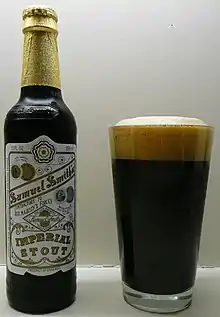
Beer is often made from barley malt, water, hops and yeast and so is often suitable for vegans and vegetarians.[1][2] Some beer brewers add finings to clarify the beer when racking into a barrel. Finings can include plant-derived products, like Irish moss, or animal-derived products, like isinglass and gelatin.[3]
Most breweries do not reveal if they do or do not use animal products in the processing of their beers; some exceptions are Samuel Smith, Heineken, Harp Lager, Anheuser-Busch, the Marble Brewery in Manchester, the Black Isle Brewery, and Black Sheep Brewery, all of whom have declared they make vegetarian and/or vegan beer.[4]
Ingredients and additives unsuitable for vegetarians and vegans
Finings
The British writer Roger Protz says that beer glassware only became popular in the 19th century, and that British cask ale is traditionally served unfiltered.
Most beer is filtered without the need for animal products, and so remains vegetarian; however British cask ale producers do not filter the beer at the end of the production process.[5] When beer is left unfiltered, the yeast that fermented the wort, and turned the sugar in the barley into alcohol, remains in suspension in the liquid. The yeast that remains suspended in the beer creates a cloudy appearance, and can have a yeasty flavour.[6] Finings are used to clear the beer of yeast – there are a variety of agents used as finings, including silicon dioxide, gelatin, polyclar, and isinglass.[7]
Isinglass is the most common fining used to clear cask ale. Isinglass is produced from the swim bladders of fish, usually sturgeon, though also those in the polynemidae, sciaenidae and siluridae families;[8] as it is an animal product, cask ale cleared with isinglass is not considered vegetarian.
Glycerol monostearate
A brewer may also use some form of animal product in the later stages of beer processing, such as glycerol monostearate, which is used to create a foam or head on the finished beer.[9]
Honey
Honey is added to some beers as an adjunct, for flavouring and to sweeten the beer. Though generally considered suitable for vegetarians, honey is an animal product, so is not suitable for vegans.
Lactose
Some beers, particularly milk stouts, contain lactose, a sugar derived from milk, and are thus not suitable for people who abstain from eating dairy products.
Packaged beers
Other than bottle conditioned, beers which are packaged in cans, bottles or kegs are filtered in some form, either pasteurised or cold-filtered. In general filtering does not require the use of finings,[10] though animal finings may be used on some batches that are too hazy to be cleared easily by the regular filtering methods.
Vegetarian breweries
Even though many beers are vegetarian, most brewers do not reveal which beers contain animal products. Those brewers who have published this information include Bartleby's Brewery,[11] Samuel Smith,[12] Anheuser-Busch,[13] MillerCoors,[14] the Marble Brewery in Manchester, UK,[15] the Black Isle Brewery,[16] Little Valley Brewery,[17] the Pitfield Brewery,[18] Black Sheep Brewery.[19] the Epic Brewing Company,[20] and Broken Compass Brewing Company.[21]
Guinness opened a new filtration plant in 2016 that made their beer vegan-friendly[22] which was expanded in 2017 to include all Guinness (i.e. all draught, bottle and can forms).[23]
See also
References
- ↑ Vegetarian Times, p 31, Mar 1993, Drew DeSilver, Active Interest Media, Inc., ISSN 0164-8497
- ↑ The Complete Idiot's Guide to Being Vegetarian, Frankie Avalon Wolfe, Alpha Books, 2000, ISBN 0028639502 p 56
- ↑ Barnes, Liam (15 September 2016). "The fishy ingredient in beer that bothers vegetarians". BBC News.
- ↑
- Active Interest Media, Inc. (December 1996). Vegetarian Times. Active Interest Media, Inc. p. 78. ISSN 0164-8497.
- Wattles, Jackie (2 November 2015). "Guinness stout plans a vegan brew in 2016". CNN Money. Retrieved 2 December 2017.
- Brewery, Marble (marblebrewers). "Good beer and vegans should never be kept apart. It goes without saying but all of our beers are vegan friendly.". 02 Mar 2016, 18:35 UTC. Tweet
- Campbell, Colin (29 January 2015). "Beer of the Week: Scotland's vegan-friendly breweries". Herald Scotland. Retrieved 2 December 2017.
- Walker, Rachel. "Vegging Out With A Beer". Reader's Digest.
- ↑ "The Vegetarian Society - Alcohol Information Sheet". www.vegsoc.org. Retrieved 2009-02-07.
- ↑ Animal Ingredients A to Z, p 73, E.G. Smith Collective, AK Press, 2004, ISBN 1-902593-81-2
- ↑ "Wine and Beer Finings". www.brewerylane.com. Retrieved 2009-02-07.
- ↑ "scientificsocieties.org" (PDF).
- ↑ "Beer and the Vegan Diet - Beer and Brewing". www.bellaonline.com. Retrieved 2009-02-12.
- ↑ Consumer, Ethical (8 May 2018). "Ethical shopping guide to Beer & Lager, from Ethical Consumer".
- ↑ "Our Ethos". Bartleby's Brewery. Retrieved 19 August 2015.
- ↑ "ss_vegansoc_letter.gif (GIF Image, 826x1121 pixels) - Scaled (60%)". www.merchantduvin.com. Retrieved 2009-02-12.
- ↑ "Vegetarian beers". www.zen159730.zen.co.uk. Retrieved 2009-02-12.
- ↑ "FAQs". millercoors.com. Retrieved 2009-02-16.
- ↑ "The Vegetarian Society - Marble brewery nomination Press Release". www.vegsoc.org. Retrieved 2009-02-12.
- ↑ "Approved Company: Black Isle Brewery". Archived from the original on 2008-10-12. Retrieved 2010-09-02.
- ↑ "About Us |". littlevalleybrewery.co.uk.
- ↑ "The Beer Shop Online". Archived from the original on 2013-10-14.
- ↑ "Black Sheep – no baa for Veggies". Archived from the original on 2009-12-09.
- ↑ Sun, Third. "Epic Brewing Company - About Epic".
- ↑ "Broken Compass Brewing". Broken Compass Brewing.
- ↑ "Guinness to Go Vegan After 256 Years". Retrieved 3 November 2015.
- ↑ "It's official – all Guinness is now suitable for vegans in draft, bottle and can form". Vegan Food & Living. 23 January 2018. Retrieved 7 November 2018.